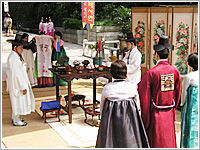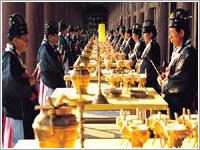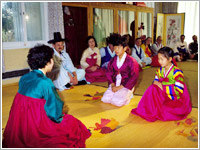 |
 |
|
 |

 People People
|
Thousands of years ago, tribes from the Altai Mountains because migrating east, and it is thought that these Tungusic people eventually settled in the Korean Peninsula becoming the nation of Korea.
The current population of Korea is approximately 46 million (November, 2000), and about one quarter of them are concentrated in the capital, Seoul. |
 Government Government
The president of South Korea acts as head of the constitutional democratic republic, which includes three branches of government, one of which is the unicameral national assembly.
 Economy Economy
Since 1970, South Korea was called ‘the Miracle of the Han River’ after it experienced amazing economic growth. In particular electronics, semiconductors, and ship building rose to a global standard, and the manufacturing industry as well as all kinds of services and the information industry also boasted high levels of achievement.
 Education Education
Korea follows the common 16-year system, and a high standard for education has become widespread. In fact, Korea may be one of the most enthusiastic nations in regards to education, and university entrance exams are said to be even more severe than in neighboring Japan. In recent years, this enthusiasm hasn’t been restricted to standard education, and pre-schooling, early education, cram schools and private lessons have become popular, as Korea establishes an education system that stresses lifelong study.
 Religion Religion
Religious freedom is guaranteed in the constitution, and there is no state religion. Presently, there are over 300 officially registered religious groups. Buddhism and Confucianism have been seen as traditional religions for generations, and Christianity was firmly established in Korea in the 18th century. From the Three Kingdoms period onward, Buddhism and Confucianism had a profound affect on Korean government, economics, society and culture. Christianity came to Korea relatively late, but gradually gained strength in the 20th century, and currently its adherents and social influence puts it on par with the traditional religions. Christianity and Catholicism continue to have an important impact on the modern ideologies and spiritual culture of Korea. |
|
 Family Life Family Life
|
Long ago, Korea had a high infant mortality rate, so people tried to have large families, as it was thought that having many offspring was admirable. Most times three to four generations would live under the same roof.
From 1960 and into the 70s, sudden industrialization and urbanization made the nuclear family become the standard, and by the 80s the number of children born per family became less than two. However, Korea still follows the traditional, Confucianist way of thinking in regards to family lineage and ancestral succession, and there is a tendency to highly regard the eldest son.
|
 Names Names
In Korea, the family name comes before, and the given name comes after. There are in excess of 300 family names and some of the most commonly used names are Kim, Lee, Park, Choi, Kang, Cho, Yoon, Jang, Lim, Han, Oh and Shin. When women marry they do not assume a new family name, due to the importance of their bon-gwan, or the name of the place of origin of their clan. |
|







